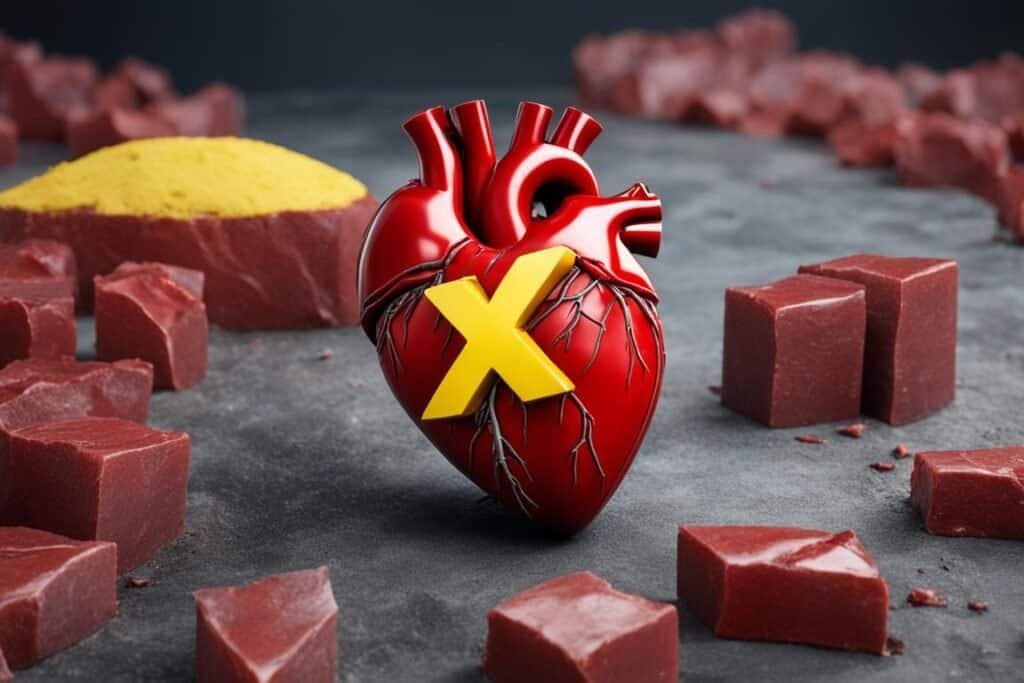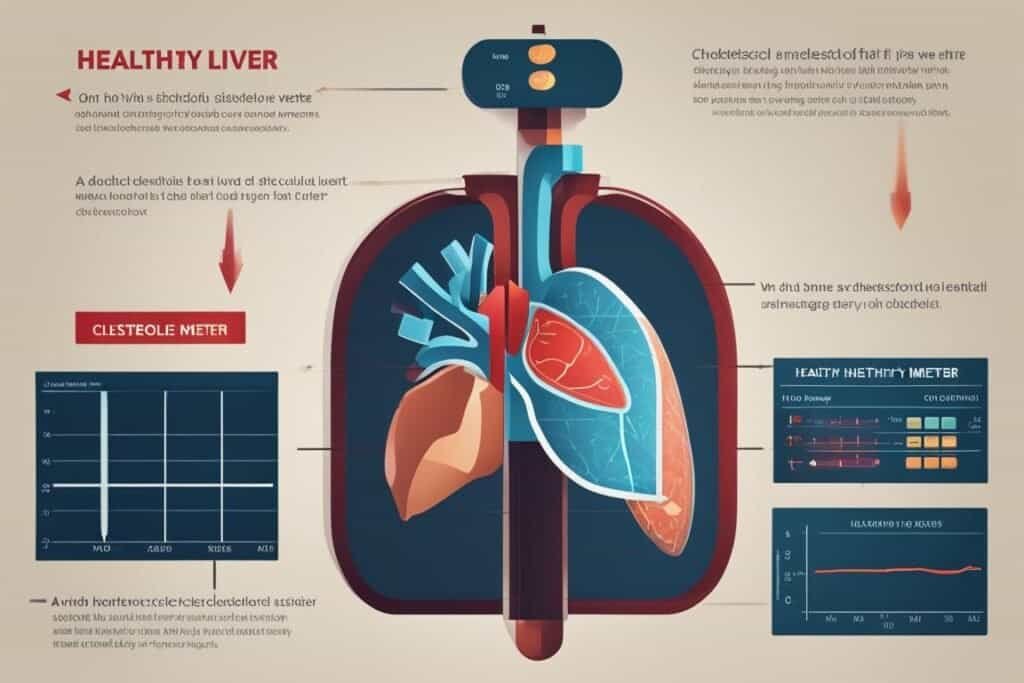Welcome to our comprehensive guide on cholesterol and its association with fatty liver. In this article, we will delve into the link between cholesterol and fatty liver, explore the risk factors, and provide insights on managing your cholesterol levels to prevent fatty liver diseases.
Cholesterol is a vital component for various bodily functions, including hormone production, vitamin D synthesis, and digestion. The liver plays a crucial role in producing and clearing cholesterol in the body. However, when the liver’s function is compromised, it can lead to abnormal cholesterol levels and contribute to conditions like nonalcoholic fatty liver disease (NAFLD) and cirrhosis.
Different types of lipoproteins carry cholesterol throughout the body. High-density lipoproteins (HDL) and low-density lipoproteins (LDL) are instrumental in maintaining a cholesterol balance. Healthy cholesterol levels encompass HDL levels of at least 40 mg/dL, LDL levels less than 100 mg/dL, and total cholesterol levels below 200 mg/dL.
Understanding the impact of high cholesterol on your health is essential, as it increases the risk of fatty deposits in blood vessels, heightening the chances of heart disease and heart attacks. Additionally, low levels of HDL cholesterol indicate a reduced ability to clear plaques and fatty deposits from the body.
Nonalcoholic fatty liver disease (NAFLD), drug-induced liver injuries, and other liver complications can disrupt the liver’s ability to produce or clear cholesterol, resulting in abnormal levels. Recognizing the symptoms of liver damage is crucial for early diagnosis and treatment.
To manage your cholesterol levels and promote liver health, making dietary and lifestyle changes is key. Following a Mediterranean diet rich in vegetables, fruits, whole grains, beans, nuts, seeds, and olive oil can have a positive impact. Additionally, limiting foods high in saturated fat, reducing alcohol intake, exercising regularly, and quitting smoking are crucial steps towards maintaining healthy cholesterol levels and liver function.
In some cases, healthcare professionals may prescribe cholesterol-lowering medications like statins to manage high cholesterol effectively.
By understanding the connection between cholesterol and fatty liver, you can take proactive steps to prevent fatty liver diseases and promote optimal liver health. Let’s dive deeper into this topic and equip ourselves with the knowledge to lead healthier lives.
Key Takeaways:
- Understanding the link between cholesterol and fatty liver is crucial for overall health.
- Managing cholesterol levels is essential in preventing fatty liver diseases.
- High levels of LDL cholesterol increase the risk of heart disease and heart attacks.
- A Mediterranean diet and lifestyle changes can promote liver health and manage cholesterol.
- Regular exercise, quitting smoking, and limiting alcohol intake contribute to healthy cholesterol and liver function.
The Impact of High Cholesterol on Health
High cholesterol levels can have a significant impact on your overall health, increasing the risk of various complications. Here’s how high cholesterol can affect your well-being:
- Elevated LDL cholesterol levels: High levels of LDL cholesterol, also known as “bad” cholesterol, can lead to the formation of fatty deposits on the walls of your blood vessels. Over time, these deposits can build up and narrow the arteries, restricting blood flow to vital organs like the heart and brain.
- Increased risk for heart disease: The accumulation of fatty deposits on blood vessels can increase the risk of heart disease. When the arteries supplying the heart muscle with oxygen-rich blood become blocked or narrowed, it can result in a heart attack or other serious cardiovascular conditions.
- Reduced ability to clear plaques and fatty deposits: HDL cholesterol, also known as “good” cholesterol, plays a crucial role in removing excess cholesterol from your arteries. Low levels of HDL cholesterol can indicate a reduced ability to clear plaques and fatty deposits, contributing to the development of cardiovascular problems.
It’s important to note that high cholesterol can also impact the health of your liver. Liver damage due to high cholesterol levels can progress silently, without noticeable symptoms. However, some signs may indicate liver damage, including jaundice (yellowing of the skin and eyes), fatigue, weakness, loss of appetite, and fluid accumulation in the abdomen. Blood tests, such as liver enzyme tests, liver protein tests, and bilirubin tests, can help diagnose liver-related problems.

Understanding the impact of high cholesterol on your health is essential for taking proactive measures to maintain your well-being. By managing your cholesterol levels and monitoring your liver health, you can lower the risk of heart disease, fatty deposits, and symptoms of liver damage.
Liver Function Complications and Abnormal Cholesterol Levels
When it comes to liver health, abnormal cholesterol levels can play a significant role in causing complications. One common liver condition associated with abnormal cholesterol levels is Nonalcoholic fatty liver disease (NAFLD). This condition occurs when there is an excessive accumulation of fat in the liver, leading to liver inflammation and damage. NAFLD can progress to a more severe condition known as non-alcoholic steatohepatitis (NASH), which is marked by liver inflammation and damage. If left untreated, NASH can further progress to cirrhosis, liver failure, and even liver cancer.
Abnormal cholesterol levels can also contribute to liver damage through drug-induced injuries. Certain medications, like acetaminophen, bromfenac, dantrolene, and diclofenac, can cause liver damage if misused or taken in excessive amounts. These drug-induced liver injuries can result in severe liver damage or even failure if not addressed promptly.
It is important to highlight that high cholesterol levels can contribute to various chronic liver diseases. When cholesterol levels are elevated, it can lead to a buildup of fat in the liver, promoting the development of liver diseases. Therefore, maintaining healthy cholesterol levels is crucial for overall liver health.
Proper management of abnormal cholesterol levels can help prevent liver damage and reduce the risk of liver-related complications. This includes adopting a healthy lifestyle, such as engaging in regular exercise, following a balanced diet, and avoiding excessive alcohol consumption. Additionally, monitoring and managing cholesterol levels with the help of healthcare professionals can guide appropriate treatment options, including cholesterol-lowering medications if necessary.
By prioritizing both cholesterol and liver health, individuals can take proactive steps towards protecting and preserving their overall well-being.
Managing Cholesterol and Liver Health
When it comes to managing your cholesterol levels and promoting a healthy liver, incorporating dietary and lifestyle changes can make a significant impact. One effective approach is adopting the Mediterranean diet, which is known for its heart-healthy benefits and cholesterol management.
The Mediterranean diet focuses on consuming whole, unprocessed foods such as vegetables, fruits, whole grains, beans, nuts, seeds, and olive oil. These foods are rich in nutrients, fiber, and healthy fats, which can help improve liver function and keep cholesterol levels in check. By following this diet, you can promote liver health and reduce the risk of developing fatty liver disease.
In addition to dietary changes, it is important to limit foods high in saturated fats, as they can contribute to elevated cholesterol levels. Opt for lean proteins such as fish and poultry instead of red meat. Avoiding raw or undercooked shellfish is also recommended, as they can harbor bacteria that may harm the liver.
Reducing alcohol intake is another crucial step in managing cholesterol and promoting liver health. Excessive alcohol consumption can cause liver damage and lead to complications such as alcoholic fatty liver disease. Limiting alcohol consumption or avoiding it altogether can significantly benefit both your cholesterol levels and your liver.

Regular exercise is an essential part of cholesterol and liver management. Engaging in physical activity helps maintain a healthy weight, increase HDL (good) cholesterol levels, and improve overall cardiovascular health. Aim for at least 150 minutes of moderate-intensity aerobic activity, such as brisk walking or cycling, every week.
If necessary, cholesterol-lowering drugs, such as statins, may be prescribed by your healthcare provider. Statins are commonly used to reduce LDL (bad) cholesterol levels and lower the risk of heart disease. It is important to follow your healthcare provider’s instructions and regularly monitor your cholesterol levels while taking these medications.
To further support your cholesterol and liver health, it is crucial to quit smoking. Smoking not only increases the risk of heart disease but also contributes to liver damage. Quitting smoking can lead to numerous health benefits, and it is a step towards better cholesterol management and liver function.
By implementing these dietary and lifestyle changes, you can take control of your cholesterol levels and promote a healthier liver. Remember, small changes can make a big difference in managing cholesterol and maintaining overall liver health.
Conclusion
Understanding the connection between cholesterol and fatty liver is crucial for maintaining your overall health. The liver, as a vital organ, plays a significant role in producing and clearing cholesterol in your body. It is important to note that high cholesterol levels can lead to liver damage, and vice versa.
To prevent fatty liver disease and promote liver health, managing your cholesterol through dietary and lifestyle changes is essential. Consider incorporating a Mediterranean diet, which includes plenty of vegetables, fruits, whole grains, beans, nuts, seeds, and olive oil. Additionally, limiting saturated fat intake, avoiding raw or undercooked shellfish, and reducing alcohol consumption are recommended steps towards a healthier cholesterol profile and liver function.
Regular exercise and quitting smoking can further contribute to maintaining healthy cholesterol levels and liver health. In some cases, your healthcare provider may prescribe cholesterol-lowering medications, such as statins, to help manage high cholesterol.
Remember, a balanced approach to managing your cholesterol and maintaining liver health is crucial for overall well-being. By understanding the link between cholesterol and fatty liver and implementing necessary changes, you can take control of your health and enjoy a healthier and happier life.

